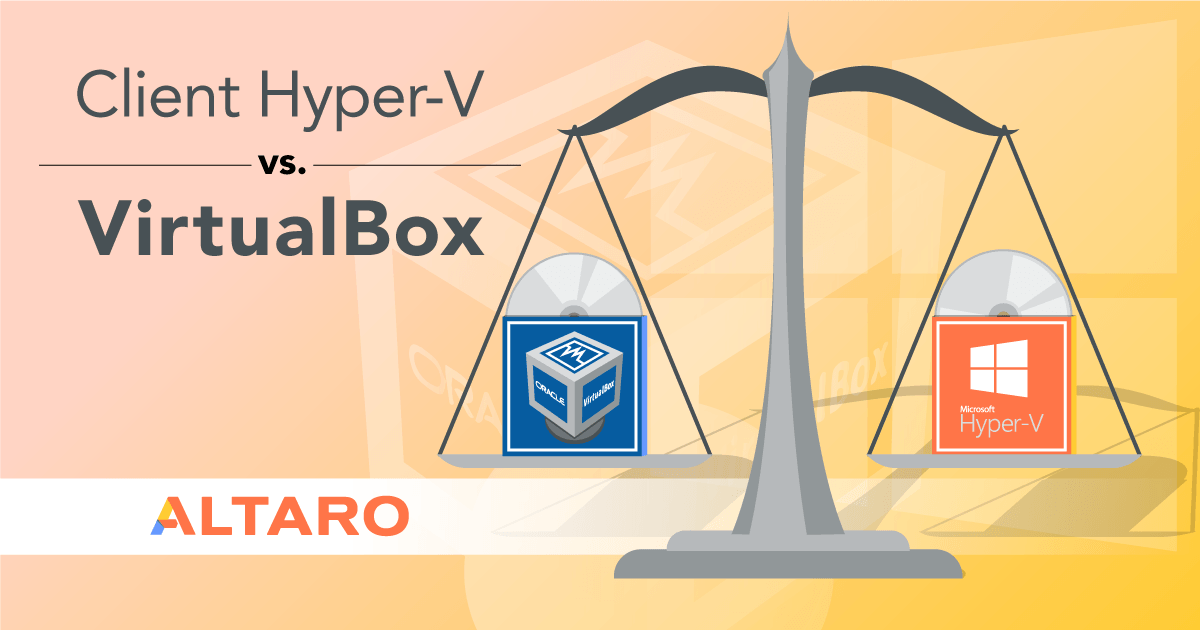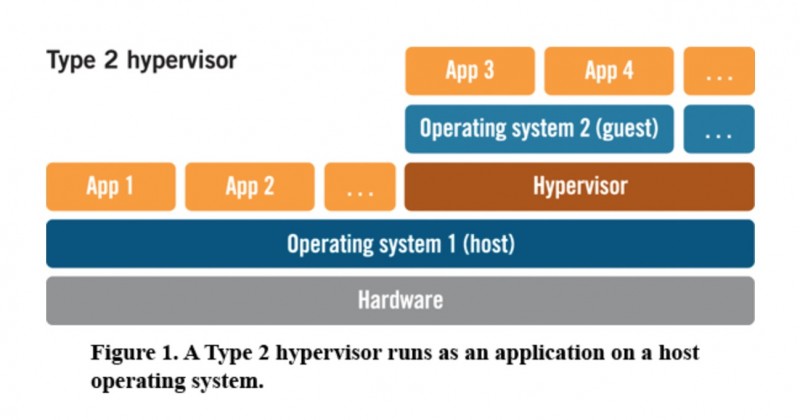
Whatever gets the job done.Even for a small environment, you can stand up two standalone Hyper-V hosts and have failover for the VMs. OP has VMware WorkStation 15 pro, it's latest version, he should use it. HyperV : Windows built-in, but (for Windows 10) you need a Windows Professional lisence. VMWare : like Virtualbox, but it costs. Just think to install Virtualbox Guest Addons for graphic performance. Virtualbox : free, opensource and easy to use.

If your using CSVs and building an HA cluster that means you are buying a shared storage array, and one worth buying is going to generally run you at least 20K. I just run with whatever the workload requirement is, the budget, and who is actually going to be supporting the final solution =P.I also mentioned essentials a $200 per host license. They run on top of the host OS and that involves a greater performance hit.But I'm not really an advocate for one or the other. VMware Player / Workstation is a type 2 (hosted) hypervisor and so is VirtualBox. VMware is a company, not a product.
I’d it saves everyone an hour of labor to have vCenter it’s a clear win. Doing a 5 year model (vSphere is perpetual and will survive the next refresh) that’s $10 a month, or $100 a month. SD-WAN is good enough to just connect you to your SaaS/Cloud provider who hosts things.$600 or $6000 was a rounding error vs my SMB departments labor (4 staff 300K a year in full carry cost). Also SME (Small medium enterprise) or whatever you want to call that step above (10 million revenue to 1 billion revenue) are really common and that's really nothing to one who has a decent amount of VM's and workloads.I know there's a lot of Sub 5 million revenue companies and MSPs who cater to them here, but there's a lot more out there.Now, in the year of 2020 I'd argue a lot of those sub 5 million revenue shops are possibly not deploying ANY servers at all, at a lot of spots.
Hyper V Vs Vmware Vs Virtualbox Manual Page States
Oracle VM VirtualBox detects Hyper-V automatically and uses Hyper-V as the virtualization engine for the host system. Then again I’ve also interviewed with someone who was giving employees netbooks and decided “nope, too cheap” and bailed.As I understand it, this used to be a problem for VirtualBox as well (in particular, use of the 'Virtualization-Based Security' feature implies the use of Hyper-V, which causes such conflicts to occur), which VirtualBox has worked around in version 6.0 (per the changelog, "Added support for using Hyper-V as the fallback execution core on Windows host, to avoid inability to run VMs at the price of reduced performance").The corresponding manual page states that "No configuration is required. In these cases it may be cheaper to throw labor at a problem. I spent mentally remembering what tools I had at CLI cost me that much lol.When I worked for a MSP we doubled or tripled out flat rate support for Hyper-V quotes over vSphere because it just cost us that much more time when something broke to fix it.I was having beers with the biggest hyper-V fanboys I know (Microsoft MVPs) a while back and they both admitted it’s still far too much Powershell.I’ve worked places that valued time at zero (Accounting didn’t care about Opex) and worked on in countries where the average person lived on less than $2 a day.
Hyper V Vs Vmware Vs Virtualbox Skin Of Hyper
VMware Cloud Foundation (Full vSAN/NSX with LCM) It's not the cheapest thing in the world, but if your trying to build a full on private cloud stack it has some realllly nice LCM capabilities. WorkSpace One - MDM, Device management, security the old airwatch stuff, SSO brokering, identity management stuff. Horizon - You only have one really serious option for a full VDI suite and that's Citrix, that said VDI isn't really if anyone's starting greenfield they seek out instead this leads me to. VeloCLoud - There's other SD-WAN providers, but for SMB types you tend to not outright buy velo-cloud but consume it as a service from someone like AT&T, Sprint etc. A few products OP might not be aware of: Note When using this feature, some host systems might experience significant Oracle VM VirtualBox performance degradation."They are planning on fixing this by changing the VMware internals to basically become a reskin of Hyper-V.Well, VirtualBox pretty much does the same thing too, from what I've read.That's like 100 products at this point.
Some are eye watering expensive (especially ones that are full turnkey SIEMs like Splunk) or cheap/free open source (ELK, which while awesome doesn't have the same alert management out of the package dashboards, and is 50x more painful to LCM and manage). LogIntelligence/LogInsight - Take your pick, there are plenty of log analytics platforms out there. Even if you bolted 3 competing products together your not getting something this powerful. HSX - Combo Wan acceleration, TLS tunneling, migration pre-stage seeding, live migrating swiss army knife.

I'd point at maybe Redhat as a competitor here? I think Cisco MIGHT compete with Uhana, maybe Huaw? VMware Integrated OpenStack, Uhana, Maestro stuff - VMware has the tooling to compete for evolved packet core networked for major telcos. (Although isn't a container runtime, which VMware has talked about something different for). Competes I would guess with Docker for that bit. BitNami - A good repo for turnkey trusted code virtual appliances and containers.
(and runs in every major cloud provider and 4000 hosting partners).KVM is the darling in ultra low cost compute cloud stuff, or people wanting to claim they built a hypervisor but invented a GUI. In general everyone I've talked to thinks the hypervisor war is over.Xen is retreating to weird niches for ARM embedded in automotive (real time OS stuff?)VSphere won in the enterprise and small medium enterprise. VSAN is tracked as #1 in HCI (IDC < generally the score keepers of the industry), and vVols while not a "product" but a feature is gaining a lot of steam.VMware has a lot of different products (this is a tiny amount, and says nothing about the non-public projects).
Redhat is still working on KVM (Paolo Bonzini still there), but I’d put OpenShift etc as a bigger focus for IBM. Microsoft is still funding Hyper-V but it’s roadmap is largely targeting Azure and Azure Stack. Xen development was propped up by Citrix (SuSE did some too). VMware on AWS wouldn’t exist without it)When I say “the industry has moved on” I mean the vendors R&D budgets. Note, Kuberentes has "won" and any attempts to do anything weird that fork it or prevent clean LCM consistently for clusters running workloads seem to be failing (hence why VMware bought Heptio, and has a lot of those cats in leadership for container stuff now).They switched when they wanted real performance that would scale, and Xen had constant TPS and other security issues.Nitro also allows for them to offer bare metal as a service. The slap fight has been around container management, supplemental features (monitoring/management/orchestration/bring up).


 0 kommentar(er)
0 kommentar(er)
